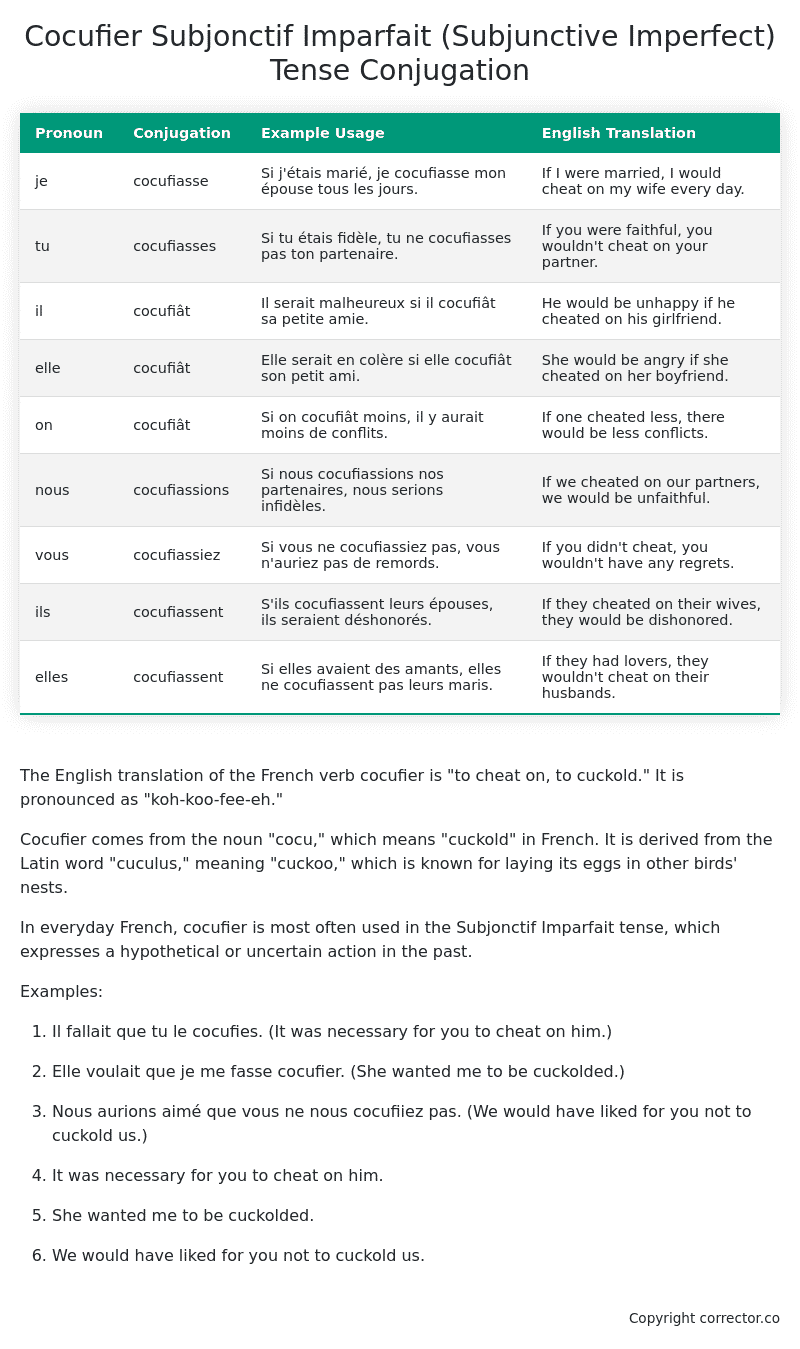Subjonctif Imparfait (Subjunctive Imperfect) Tense Conjugation of the French Verb cocufier
Introduction to the verb cocufier
The English translation of the French verb cocufier is “to cheat on, to cuckold.” It is pronounced as “koh-koo-fee-eh.”
Cocufier comes from the noun “cocu,” which means “cuckold” in French. It is derived from the Latin word “cuculus,” meaning “cuckoo,” which is known for laying its eggs in other birds’ nests.
In everyday French, cocufier is most often used in the Subjonctif Imparfait tense, which expresses a hypothetical or uncertain action in the past.
Examples:
-
Il fallait que tu le cocufies. (It was necessary for you to cheat on him.)
-
Elle voulait que je me fasse cocufier. (She wanted me to be cuckolded.)
-
Nous aurions aimé que vous ne nous cocufiiez pas. (We would have liked for you not to cuckold us.)
-
It was necessary for you to cheat on him.
-
She wanted me to be cuckolded.
-
We would have liked for you not to cuckold us.
Table of the Subjonctif Imparfait (Subjunctive Imperfect) Tense Conjugation of cocufier
| Pronoun | Conjugation | Example Usage | English Translation |
|---|---|---|---|
| je | cocufiasse | Si j’étais marié, je cocufiasse mon épouse tous les jours. | If I were married, I would cheat on my wife every day. |
| tu | cocufiasses | Si tu étais fidèle, tu ne cocufiasses pas ton partenaire. | If you were faithful, you wouldn’t cheat on your partner. |
| il | cocufiât | Il serait malheureux si il cocufiât sa petite amie. | He would be unhappy if he cheated on his girlfriend. |
| elle | cocufiât | Elle serait en colère si elle cocufiât son petit ami. | She would be angry if she cheated on her boyfriend. |
| on | cocufiât | Si on cocufiât moins, il y aurait moins de conflits. | If one cheated less, there would be less conflicts. |
| nous | cocufiassions | Si nous cocufiassions nos partenaires, nous serions infidèles. | If we cheated on our partners, we would be unfaithful. |
| vous | cocufiassiez | Si vous ne cocufiassiez pas, vous n’auriez pas de remords. | If you didn’t cheat, you wouldn’t have any regrets. |
| ils | cocufiassent | S’ils cocufiassent leurs épouses, ils seraient déshonorés. | If they cheated on their wives, they would be dishonored. |
| elles | cocufiassent | Si elles avaient des amants, elles ne cocufiassent pas leurs maris. | If they had lovers, they wouldn’t cheat on their husbands. |
Other Conjugations for Cocufier.
Le Present (Present Tense) Conjugation of the French Verb cocufier
Imparfait (Imperfect) Tense Conjugation of the French Verb cocufier
Passé Simple (Simple Past) Tense Conjugation of the French Verb cocufier
Passé Composé (Present Perfect) Tense Conjugation of the French Verb cocufier
Futur Simple (Simple Future) Tense Conjugation of the French Verb cocufier
Futur Proche (Near Future) Tense Conjugation of the French Verb cocufier
Plus-que-parfait (Pluperfect) Tense Conjugation of the French Verb cocufier
Passé Antérieur (Past Anterior) Tense Conjugation of the French Verb cocufier
Futur Antérieur (Future Anterior) Tense Conjugation of the French Verb cocufier
Subjonctif Présent (Subjunctive Present) Tense Conjugation of the French Verb cocufier
Subjonctif Passé (Subjunctive Past) Tense Conjugation of the French Verb cocufier
Subjonctif Imparfait (Subjunctive Imperfect) Tense Conjugation of the French Verb cocufier (this article)
Subjonctif Plus-que-parfait (Subjunctive Pluperfect) Tense Conjugation of the French Verb cocufier
Conditionnel Présent (Conditional Present) Tense Conjugation of the French Verb cocufier
Conditionnel Passé (Conditional Past) Tense Conjugation of the French Verb cocufier
L’impératif Présent (Imperative Present) Tense Conjugation of the French Verb cocufier
L’infinitif Présent (Infinitive Present) Tense Conjugation of the French Verb cocufier
Struggling with French verbs or the language in general? Why not use our free French Grammar Checker – no registration required!
Get a FREE Download Study Sheet of this Conjugation 🔥
Simply right click the image below, click “save image” and get your free reference for the cocufier Subjonctif Imparfait tense conjugation!

Cocufier – About the French Subjonctif Imparfait (Subjunctive Imperfect) Tense
Formation
Common Everyday Usage Patterns
Interactions with Other Tenses
Subjonctif Présent
Indicatif Passé Composé
Conditional
Conditional Perfect
Summary
I hope you enjoyed this article on the verb cocufier. Still in a learning mood? Check out another TOTALLY random French verb conjugation!


